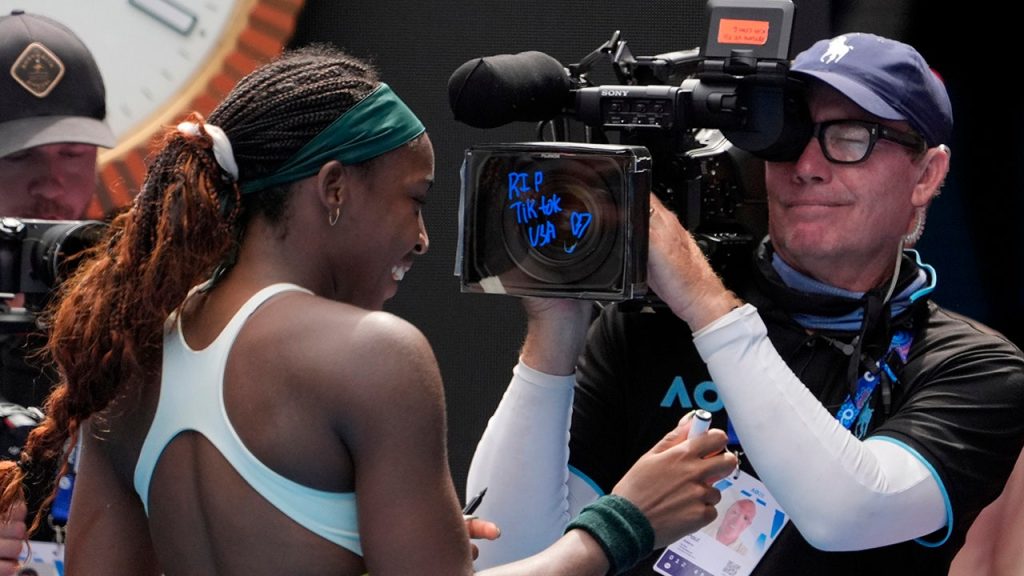Coco Gauff’s triumph over Belinda Bencic in the Australian Open’s fourth round wasn’t just a display of her burgeoning tennis prowess, but also a poignant commentary on the evolving digital landscape. Her post-match tribute, scrawled across a camera lens – “RIP TikTok USA” accompanied by a broken heart – resonated with millions, encapsulating the sudden digital void left by the app’s ban in the United States. Gauff, a prominent figure on the platform with over 750,000 followers, expressed her dismay at the ban, highlighting the app’s role as both a source of entertainment and a pre-match ritual. Her lament echoed the sentiments of countless American users who found themselves abruptly cut off from a platform that had become integral to their daily lives. This incident underscores the growing influence of social media platforms like TikTok, their integration into the routines of individuals, and the profound impact of their sudden absence.
The timing of Gauff’s TikTok eulogy was particularly striking, coinciding with the app’s official ban in the United States. The ban, stemming from national security concerns, resulted in a stark message for American users: “Sorry, TikTok isn’t available right now.” This abrupt cessation of service left users in a digital limbo, unable to access the platform’s vast library of short-form videos, a significant source of entertainment, information, and social connection for many. The ban’s impact extended beyond individual users, affecting content creators, businesses, and even athletes like Gauff who utilized the platform for engagement and personal expression. This event highlighted the vulnerability of digital platforms to geopolitical forces and the potential for sudden disruptions to online communities.
The ban on TikTok, while driven by national security anxieties surrounding data privacy and potential foreign influence, sparked a flurry of political activity and debate. Outgoing President Trump, a vocal critic of the app, initially indicated a willingness to negotiate a solution to reinstate TikTok under certain conditions. However, on the eve of his inauguration, he announced his intention to sign an executive order extending the deadline for the ban’s enforcement. This move, seemingly contradictory to his previous stance, aimed to provide more time for negotiations and potentially reshape the app’s ownership structure to address national security concerns. The back-and-forth surrounding the ban reflected the complex interplay between national security, economic interests, and the evolving role of technology in society.
Trump’s proposed executive order sought to create a window for a deal that would safeguard national security while allowing TikTok to continue operating in the U.S. He envisioned a joint venture with a 50% U.S. ownership stake, a move intended to address concerns about data control and potential foreign influence. This proposition, however, raised further questions about the feasibility of such a complex arrangement and the potential implications for TikTok’s global operations. The future of TikTok in the U.S. remained uncertain, hanging in the balance of ongoing negotiations and the incoming administration’s approach to the issue.
The saga of TikTok’s ban in the U.S. underscored the platform’s significant cultural impact and its rapid rise to prominence. From its humble beginnings as Musical.ly, the app evolved into a global phenomenon, capturing the attention of millions with its short-form video format and diverse content offerings. For many, like Coco Gauff, TikTok became an integral part of their daily routines, a source of entertainment, connection, and even pre-performance rituals. The ban’s disruptive effect highlighted the platform’s pervasiveness and the void it left in the digital landscape for American users.
In the broader context, the TikTok ban served as a microcosm of the larger debate surrounding data privacy, national security, and the growing influence of technology. The incident raised fundamental questions about the balance between individual freedoms, national security interests, and the role of government in regulating digital platforms. The future of TikTok in the U.S. remained a matter of speculation, but its impact on the digital landscape and the broader conversation surrounding technology and society was undeniable. Coco Gauff’s on-court tribute, a simple yet powerful gesture, served as a poignant reminder of the app’s cultural significance and the ongoing debate surrounding its future.


